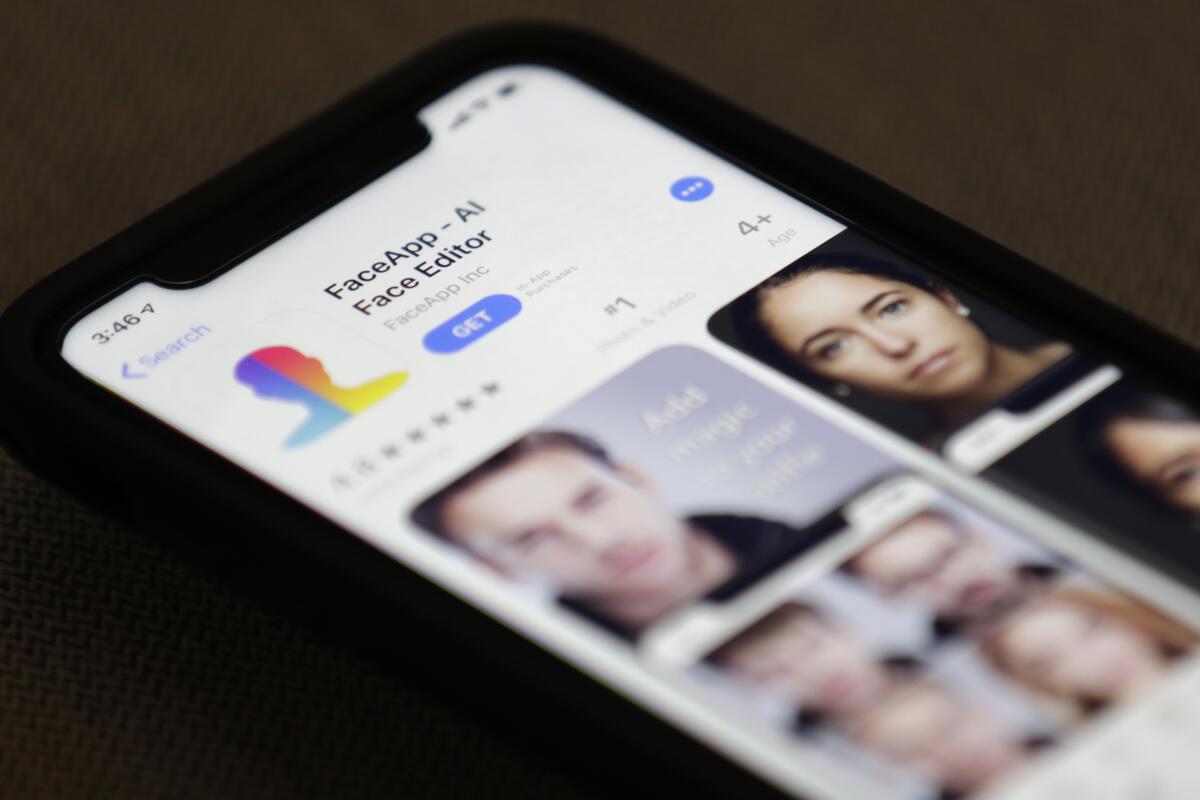Op-Ed: A lesson from FaceApp: Learning to relate to the older person we will become

- Share via
When given the choice, about 85% of people say they would not want to know about some negative event far in the future. Yet in recent days more than 150 million people around the globe have downloaded FaceApp, which allows users to see how they might age in real life — wrinkles and all.
Despite widespread privacy concerns over the uploading of photos to the app, millions purposely sought out a program that marks a personal passage of time. Many had fun with it, joking that the app made them look like “Moses on his 584th birthday” or claiming they left comments like “love the FaceApp old filter!” on their enemies’ “normal selfies.”
Beneath the humor of playfully gazing into the future is a serious subject: How do we learn to relate to our future selves? It’s important that we try to because it could help strengthen the long-term decisions that we make.
More than half of the respondents in a recent survey of 2,800 Americans said they rarely or never thought about what their lives might be like 30 years from now. This isn’t necessarily surprising, since most of us are firmly rooted in the present and thinking about the distant future can seem like, well, a distant priority.
Why do we often fail to make sacrifices for the grayer versions of our present-day selves? My ongoing research might offer an explanation: We tend to think about our future selves as if they are someone else, wholly different from who we are today. A brain-imaging study I co-authored found the brain activity patterns that are evoked by thoughts about a future self are quite similar to the brain activity that arises when we think about other people today.
It may not be problematic to think about our future selves as if they are other people, as long as we see them as people with whom we have a close, emotionally bonded relationship — for those are the sorts of relationships that inspire us to make sacrifices.
But if we think of our future self as another person who is more of a stranger to us, then it makes more sense to do what we want to do right now. Eat the kale and quinoa salad or crush a double-double from In-N-Out? The former is clearly better for our long-term health, but if future me is not a version of myself I identify with — then why should I care about how well his heart functions?
In an effort to short-circuit these empathy gaps, my research collaborators and I have tried to humanize people’s future selves in the same way others have tried to humanize charity recipients. Given that a photograph of one hungry child can spark emotional reactions, and cause the viewer to donate, we have presented research participants and everyday people with vivid, visual images of their distant selves.
Doing so seems to help. In one study, we established that people who viewed age-progressed images of themselves expressed increased intentions to save for retirement. And in a recently completed project in Mexico, we found that exposure to future-self representations led more people to contribute to their pensions.
Despite this research, I’m skeptical that the rash of users who have downloaded their aged images will suddenly increase their 401(k) contributions and radically cut back on carbs. The reason? The app isn’t paired with an immediate opportunity to change any of these things. Water travels down the easiest available path, and people are no different. If we want to change how people make long-term decisions, then the process for doing so needs to be easy.
The lesson from FaceApp shouldn’t be that we need to marry hi-tech visuals with 401(k) enrollment portals. Images may aid imagination, allowing us to envision a future that can be quite difficult to picture. But we live in an era notorious for dehumanization, in which it can be hard to foster bonds with others — let alone with our distant selves.
The lesson, then, takes the form of a question: What more can be done to prompt us to think about, care for and empathize with who we will one day become?
Hal E. Hershfield is an associate professor of marketing and behavioral decision making at the UCLA Anderson School of Management.
More to Read
A cure for the common opinion
Get thought-provoking perspectives with our weekly newsletter.
You may occasionally receive promotional content from the Los Angeles Times.










